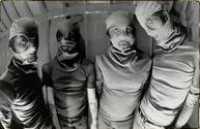"Go tweak yourself to death, you rich, big-headed rock stars. You are nothing but a bunch of image-concerned ass-wipes. All of your side-projects suck. And I hope you guys realize the only reason any of your side-projects are big is because you're in The Locust. By signing on to Epitaph, you will just destroy your underground following, and the mainstream will not catch on. So, you'll just end up destroying The Locust. Not that I have a problem with that."
Such is the type of "fan-mail" flack The Locust catches from the various playerhaters, misguided elitists, and jealous scenesters of the punk/ indie rock world. This San Diego-based band has long been at the center of controversy due to everything from its much-discussed penchant for tight pants, rumors of druggie decadence or -- as one Chicago-based fanzine put it -- "ruining hardcore for fat kids."
But if you ask bassist/ vocalist Justin Pearson, his intentions are nothing but sincere.
"I just want to change the way people look at music, or maybe just destroy it in general," says Pearson. "Things are so normal, safe, 4/4 timing, blah. Sometimes it makes me want to throw up."
The Locust has been throwing up in the face of conventional music since 1995, when the band formed from the shards of San Diego hardcore stalwarts, Swing Kids and Struggle. Since then, it has hosted a veritable Who's Who of punk rock royalty. Everyone from Tristeza/Album Leaf/GoGoGo Airheart/Crimson Curse's Jimmy Lavelle, to Tarantula Hawk's Dave Warshaw and Dylan Scharf, and Cattle Decapitation's David Astor have gone in and out of the band's turnstile.
As far as the current line-up, Pearson has been in a string of bands almost too lengthy to list -- with heavyweight acts like Holy Molar, Some Girls, Swing Kids, The Crimson Curse, and Struggle registering as luminaries. Also, drummer Gabe Serbian was in Cattle Decapitation, Alec Empire's backing band, and is now in Holy Molar. Keyboardist/ vocalist Joey Karam was in Le Shok, and their alter-ego, Death Drug. And, finally, guitarist/ vocalist Bobby Bray also plays in Holy Molar.
Recordings-wise, The Locust has been nothing but prolific -- putting out a slew of multi-format releases, along with infamous creative merchandising like Locust compacts -- called "coke mirrors" by the band's detractors -- and die-cast belt buckles.
In 1995, The Locust released its first record, a split 10" EP with Man Is The Bastard (King of the Monsters), following that up with a split 5" picture disc with Jenny Piccolo (Three One G) and then its debut self-titled 7" (Gold Standard Laboratories). Three years after the release of their 10" debut, GSL released The Locust's first full-length, a self-titled, 13-minute-long punk opus, which sold out the first pressing of 2000 in just a few days. Soon after, came a split 7" with Arab on Radar (GSL).
In 2000, The Locust cemented its difficult reputation by putting out a double 12" of electro/ drum 'n' bass remixes of the song "Well I'll be a Monkey's Uncle," with folks like Kid 606, I am Spoonbender and Sinking Body turning the song's crazy noise bursts into even crazier electronic splatter paintings.
The band's final recording as a five-piece came a year later with "Flight of the Wounded Locust" (GSL).
Showcased for the first time as a four-piece on a split 7" with Tokyo's Melt Banana (GSL), Pearson, Karam, Bray and Serbian offer a sound far removed from their grindcore-leaning past. The songs, as a whole, are fast -- usually under a minute -- brutally ultra-violent and drenched in sci-fi-noise, gruesome insectoid keyboards and herky jerky scream/ sing vocals -- described by one journalist as "a car-wreck with vocals."
But inaccessible as that might seem, Bray thinks that The Locust's music is the perfect solution for futuristic living.
"I think that there's definitely plenty of room in the mainstream for music to evolve as society evolves," says the guitarist. "Sound is kind of a musical metaphor for human thought, and in our present-day postmodern contemporary capitalistic societies, our music is a reflection of how brains need to function in order to survive -- rapid tempo changes, super fast-paced problem solving, and weirdness to hold it together."
But, of course, that's just the future, a place where the band -- at least artistically -- will always remain.
Source: http://www.thelocust.com/
